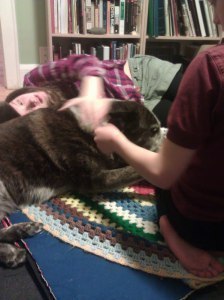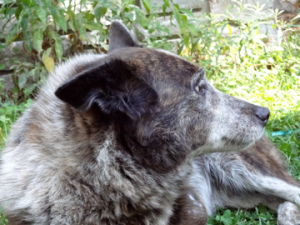Kelly Barnhill's Blog, page 12
February 14, 2013
The strange Valentines of the long-married.
WHEN you are old and grey and full of sleep,
And nodding by the fire, take down this book,
And slowly read, and dream of the soft look
Your eyes had once, and of their shadows deep;
How many loved your moments of glad grace,
And loved your beauty with love false or true,
But one man loved the pilgrim Soul in you,
And loved the sorrows of your changing face;
And bending down beside the glowing bars,
Murmur, a little sadly, how Love fled
And paced upon the mountains overhead
And hid his face amid a crowd of stars.
- William Butler Yeats
When I was twenty years old, I was directionless and lost: a raving lunatic; a blistering idiot. I was just recently back in the country, just coming out of a very damaging relationship, and just trying to put myself back together. I was a scattering of ash and dust, the glint of stars, the press of clouds.
And then I met my husband. And then my life was very different.
We are both thirty-nine now, so we’ve been together for a long time. I know the grooves of his hand better than I know my own. I could hear his voice in the middle of a crowd and find him in a shot. I know each gray hair, each worry-line, each muscular heft. When we marry, we love not only the young person standing next to us, the person right now, but we love the very old person that they will be. Creaky joints. Sagging skin. Hair as pale as thistledown. And the deepening shadows of the eyes. These things usually don’t land on Valentines, but they stir me to the core. The long-married find themselves, very often, unstuck in time. We kiss the lips of our beloved and we don’t know where we will find ourselves – are these the twenty-year-old lips? Or the forty-year-old? Or the eighty-year-old. The entirety of a life built together can hinge on a single kiss.
I have told this to my husband. He thinks I’m nuts.
Anyway, a while back, I published this piece in the Interfictions Annex. It’s four linked vignettes, all exploring the magical-realistic quality of love. But the thing is? It started as a Valentine. To my husband. This is what I wrote to him:
It’s cold and we need fire. I wrap myself in a blanket while you clomp to the porch and clomp back in, your arms wrapped around a pile of logs raining debris in a trail from the door to the fireplace.
You open the door and lean in, gather ash and dead coals with your hand, deposit it into a bag, let it fall in a soft gray cloud. Slowly, you pile the knots of paper just so and lay down the small logs and light.
As I watch you, I see what you will look like when you are very old. Your nose enlarges and bulbs forward: a tender beak. Your smooth brow folds upon itself like a topographical map. Your hands, your long fingers, gnarl at the knuckle, sprout spots like mushrooms, grow yellow at the nails. Your hair, shining now in the growing light, thins, pales, floats over your shining scalp like feathers.
Outside, the snow arranges itself into mountains, canyons and plains, retelling the story of a land built from the cruelties of water and wind. Outside, the black sky cracks into infinite shards of light, while the air etches love poems on the windowpanes. Outside, the wind hurls itself against the house, while the trees lean and flail as though about to fall.
Happy Valentines Day, to you and yours. And I love you.
Filed under: Uncategorized Tagged: love poem, marriage, Valentine's Day, William Butler Yeats


February 5, 2013
An important question.
I am having one of those days when my heart is pulled in nine directions and my mind is pulled in fifteen other directions and my body is pulled to the edges of the universe and back again.
I keep circling back to this picture by Arnold Lobel:

I love this picture, I really do. It’s from the book The Headless Horseman Rides Tonight, a book of creepy kids’ poems by Jack Preletusky that haunted my soul when I was a kid, and probably is responsible for the sheer number of dead bodies in my short fiction (I’m like a fictional-character mass murderer at this point. I never created an individual in my imagination that I didn’t eventually attempt to slaughter.). Anyway. This picture.
I feel defined by this picture today.
But what bit? I’m not sure. Am I the ship, about to break apart? Or am I the astonished-looking giant squid? The one who, frankly, looks ambivalent about whether or not it wants to be tearing apart the ship in the first place. The one who looks as though it’s asking itself, “Why ships? And what does it all mean? And do I even like devouring steam ships? I’m not sure that I do.”
Or am I the water?
Or the dark, cold floor?
Or the wide, blue sky?
I also, quite frankly, feel a little like this picture, from Wanda Gag’s Millions of Cats (another seminal tome in the mental library of my seven-year-old heart):
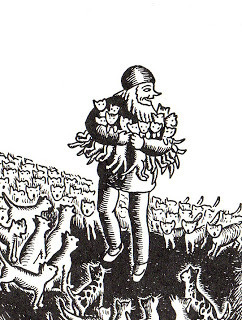
Like the old man in the story, I am well meaning. Like the old man in the story, I have the best of intentions. And like the old man in the story, there are too many damn cats. (Or in my case, Things To Do. And Things To Worry About. And so forth.
So who are you today? Insatiable squid? Insufferable cat? Overly-amenable old man? Are you a doomed ship or a hungry mouth or a wide open sea?
Or perhaps you are something else entirely.
Filed under: Uncategorized


February 2, 2013
If those boys would stand still for five minutes, they’d write a damn good novel.
Leo and his friends are careening up and down the stairs, a cloud of knees and elbows and supposedly-brushed teeth and glinting blonde hair. They are making engine sounds and laser sounds and sounds of exploding nebulae (which, being a big dork, I did have to explain to them do not make a sound in the vacuum of space, and they looked at me with blank eyes and continued with the swan-songs of doomed stars) and six-shooters and race cars and TNT disasters in abandoned silver mines.
They run down, and someone yells, “I’m Pete Petowski and the world will be mine in forty seven seconds MINE I TELL YOU!”
They run up and yell, “BEWARE THE POWER OF MR. JIBBLYKINS!”
And, “I do so have cyborg eyes.”
And, “I’d rather go the the dentist than kiss a girl.”
They run down and someone asks, “If you kill a zombie and then infect it with a new zombie virus is it a half-zombie or a double-zombie?”
And, “Can zombies be pirates? Can they go in space?”
They run up and yell, “I ALREADY GOT YOU WITH MY LASERS. YOU ARE SO OUT!”
Only to be returned with, “Well, I used my laser-blockers. So.”
And as the game continues, I catch little bits as they float down the stairs.
“We each get sixteen superpowers. I call having the power to beat every superpower. Which one do you want?”
“Which would be better: an outerspace circus in space, or an underwater circus with squids and octupuses and sharks?” “Or both?” “You’re right. Both.”
“Oooo! Zombie fingers!”
“Okay, fine. We all speak fluent Wolf.”
“Toe jam is just the nice way of saying toe poop. No one likes to believe that their toes can poop, but they do all the time.“
“They sent an army of miniature cyborgs hiding in cereal boxes. The attack will happen at breakfast!”
“I don’t need any weapons. My fingernails were implanted with lasers when I was a baby. That’s what everyone does on my planet.”
“No matter what, I have a second brain.”
“You’re right. Your farts really are grosser than mine.”
“Baby dinosaur? Well, of course.”
“Donuts ARE TOO dinner food.”
“It doesn’t matter if we guard our ice castle with polar bear armies or not. NO ONE CARES IF WE TAKE OVER THE ARCTIC CIRCLE.”
“We have to stop Dr. Nimblenuts and his atomic EXPLODING ANTS!”
“You’re right. A penguin army would be awesome.”
“Is there such thing as chocolate salsa?”
“Let’s say we were separated from our families and raised on a remote island by ninja spiders.”
“My boots have levitation upgrades, but they’re on the fritz. That’s why this leg can’t come off the ceiling.”
“You can too build a space ship from bottle caps. My dad told me.”
“Fine. I’m King. You’re President and you’re Supreme Ruler. And I’m also the Pope.”
“It is not a dumb game at all, Ella. We’re whales. Flying whales. In space. What’s dumb about that?”
“Well, on this planet people’s butts are on their heads.” “Actually, our planet is the only one where people’s butts are, you know. Where butts go.”
“It would totally be good if everything was flavored like raspberries. Raspberry cereal. Raspberry milk. Raspberry bacon. Raspberry pizza. Raspberries. They’re delicious!”
I’m sitting here, trying to finish my Sasquatch story. Instead I’ve been listening to these kids for the last hour. It’s more entertaining than the teevee.
What’s distracting you from your writing today?
Filed under: Uncategorized Tagged: fiction is my job, parenting, raising boys, these kids are crazy, writing distractions


February 1, 2013
Fragile, and fading, and brave.
My kids, when they woke up this morning, bolted out of bed and ran to where their dog was sleeping, skidding along the wood floors on their knees.
Harper nested in a clump of blankets next to the heating vent. The kids had organized it the night before, and I had carefully lifted my fifty-pound beastie – built for running, leaping, and agile bounding from rock to fence to rock – into the softness of her sick-bed.
She will not stand. She will not walk. And outside of some half-hearted lapping of a half-cup of water, she will not eat or drink.
The kids snuggled around her, putting their faces next to her nose, wrapping their arms around her middle.
“You’re still alive,” the kids said. “I knew it.”
Last night, when I put Leo to bed, I told him that Harper was in pretty rough shape. She’s been in rough shape before, of course (heck, she’s like a million years old), but this feels different.
“Is she going to die?” Leo said.
“Probably not tonight,” I said. “But it’s hard to tell.”
“But she is dying.”
“Yes.”
“Maybe we should sell her.” Leo turned his body to the wall.
This sentiment surprised me. I spoke slowly. “That’s an interesting strategy,” I said. “What makes you say that?”
“I don’t want to watch her die,” he said.
We were quiet for a long time. The lights were off and the room was cold and he and I pulled closer under the covers. “I can understand that,” I said. “But think about Harper. She’s hurting and fragile and confused. But the thing that makes her happy is her family. You and your sisters, especially. She has been with you for your whole life. Don’t you want to be with her for her last, important days?”
“I hope she doesn’t die.”
“Me too.”
“But she will, though. Someday. Right?”
“Everything that is alive is fragile and precious. Everything is stardust and dirt and spring green and the breath of god, and then it fades away. Harper is fading. And so will we.”
“Harper is fragile,” Leo said. “But she’s brave. She’s not scared at all. She’s brave and snuggly.”
“And who knows,” I said. “She may rally.”
“What does rally mean.”
“It’s when someone is looking worse and worse, and suddenly they are better. Harper has looked pretty bad before, and sometimes I thought she was dying. And then she rallied.”
“I hope she rallies.”
“Me too,” I said. The wind howled outside. My dog was downstairs. Breathing. Breathing. Not getting up. My poor baby. “And who knows. She’s made of magical stuff. Maybe she’ll outlive us all.”
Leo sighed deeply. “Mom,” he said. He spoke slowly. Like he was explaining something obvious to an idiot. “There is only like a two percent chance of that happening.”
I told him that I liked those odds. And then I kissed him goodnight.
Filed under: Uncategorized Tagged: Children, Dying pets, Kids and dogs, palliative care


January 29, 2013
In which some Cub Scouts take me down a notch or two.
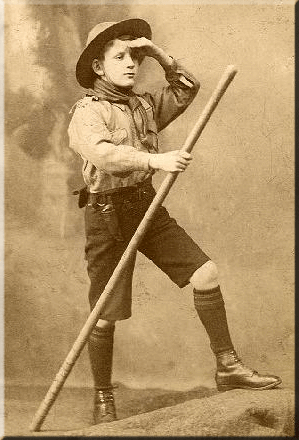
Last night, I had my career, my integrity, my professional efficacy – nay, my very Self – called into question by a bunch of rowdy, eight-year-old Scouts.
Usually, my darling husband (eagle scout, voyageur, jack of all trades and man for all seasons) is in charge of taking my son to Cub Scouts, but last night he was doing his duty as a Princeton alum and was interviewing a young, bright-eyed, starry-futured applicant, and I, therefore, was in charge of The Boy.
So, with his neckerchief and his badges and his belt loops, his official uniform shirt and Wolf Cub seed hat, we set off into the slushy wasteland of Winter Minnesota and walked into the chaos of a Scout meeting. The boys were running around, jumping on chairs, wrestling, hitting balloons in the air, play fighting, engaging in fart contests, taking flying leaps across tables, and so forth, when my son suddenly said to a group of boys, “That’s my mom. She’s an author.”
The boys were not impressed.
“A real one,” Leo clarified. “She writes books. Lots of ‘em.”
Now, I wrote about this a couple months ago when my kids expressed their very strong aversion to allowing anyone (and, specifically teachery anyones) to know that I wrote books for a living. Because it’s embarrassing, apparently. And it makes teachers assume things about them (wrong things, my kids said). Fine. So you can imagine my surprise at my son’s sudden blabbing about my chosen carrer.
The boys stopped their playing and regarded me.
“Is that true?” one boy said. He had very tall, very curly brown hair.
“Yep,” I said.
“Real books?” another boy said. His hair had been shaven close to his head, what was left was as dense as moss. “Like with words and pictures.”
“Yeah,” I said. “Some have only words. Others have words and a few pictures. Others have words and mostly pictures. It’s a mix.”
“Like what?” another boy said. This one had glasses.
“What pictures?” I said.
“No,” said the big boy with the short, dense hair. “What books?”
“Well,” I said. “I wrote The Mostly True Story of Jack.”
The boys gave me a blank look. “I’ve never heard of it,” said the boy with tall hair.
“Well,” I said. “You’re pretty young. It’s mostly fourth and fifth graders who read that.”
The boys all crossed their arms and gave me a look that said, yeah. tell me another one.
I changed the subject. “Did you guys have a fun time at Winter Camp?”
“Did you write The Magic Tree House?” asked boy-in-glasses.
“No,” I said. “But I wrote a book called Iron Hearted Violet.“
“That one has a dragon in it.” Leo said.
“OH!” said the boy with mossy hair. “Is it How to Train your Dragon?” his eyes were wide and bright. He glowed.
“No,” I said.
“Oh,” he said, crumpling, his face sinking into a skeptical expression.
“Did you write Goosebumps?”
“Alas, no,” I said.
“Dr. Seuss?”
“No,” I said.
“Stink?”
I sighed. “No.”
There was a long pause. The boys looked – well, not mad; just disappointed.
“You’re not a real writer, are you?”
I gazed at the ceiling. Because, you know? It’s not like I didn’t agree. This thing about legitimacy verses fraudulence, this assumption of the fakery and poseury? This is a thing that I fight every day. It eats me up sometimes. And I’m not alone. Hell, it might be eating you up. Right now. Every day we have to fight against it in order to return to the page. And, for my part, I’m not always successful.
“I think I’m probably not,” I admitted. Leo, I could see, was disappointed. I didn’t blame him. I was not nearly as impressive as he though I would be. I’m sorry, I mouthed at my son, but he wouldn’t meet my eye. “Let’s go make cupcakes,” I said to the boys. And so we did.
And it was wonderful. I got milk on my shoes and flour on my butt and egg in my hair and batter up my nose and a large chunk of frosting in my purse (that part remains a mystery; my purse wasn’t even in the kitchen; the boys have assured me they are blameless; they told me with wide eyes and angelic expressions. Little stinkers.). Later, after the boys ostensibly washed their dishes, some of the parents stayed behind to re-wash the dishes while the rest of the parents and Scouts went upstairs to the scout room to discuss the upcoming pinewood derby.
Twenty minutes later, the Scouts came thundering down the stairs.
One of them held – I swear to god - The Wee Book of Pee.
“Did you write this?” tall-haired-boy said.
“Yes,” I said.
“I TOLD YOU,” Leo said. “DIDN’T I TELL YOU?”
The boy looked at the book, examined the name and pursed his lips together. “I like that book.”
“We have that book in my school,” glasses boy said.
“So do we,” moss-hair said.
“WE GO TO THE SAME SCHOOL,” glasses said.
“I don’t” said tall hair, “but we have it too. In the library.”
“It’s part of a series,” Leo said. He was beaming. He was sparkly. He could hardly stay in his shoes. I was astonished. “But it’s the best one. I told you she was a real writer.”
“Are all of your books about pee?” another boy said. He was shorter than the others, with very large, brown, solemn eyes.
“No,” I said.
“Well,” he said, his voice very serious, “they probably should be.”
Filed under: Uncategorized Tagged: Boy Scouts of America, Cub Scout, raising boys, writer-mama


January 24, 2013
The Art of the Talisman
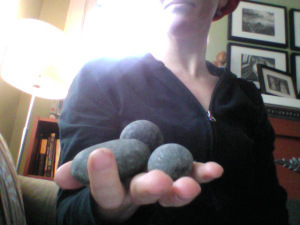 It happens sometimes, that a book grinds to a halt. In my experience, this is the rule and not the exception. I will be, for months and months, on firm ground and with a clear path. I will be surefooted, bright-eyed, brave. The story stands around me like an unshakable fortress, a cunning edifice, a cozy den.
It happens sometimes, that a book grinds to a halt. In my experience, this is the rule and not the exception. I will be, for months and months, on firm ground and with a clear path. I will be surefooted, bright-eyed, brave. The story stands around me like an unshakable fortress, a cunning edifice, a cozy den.
And then it collapses. And I am struggling with falling beams and crumbling plaster and illogical plans. Without tools. Without power. In the absolute dark.
This is where I am currently. I have been here before. I have erased and recomposed and erased this book more times than I can count (it is a method of writing that I do not recommend). I have promised the manuscript to my agent, to my writer’s group, to everyone. But it is in pieces, and I am heartsick.
(As I said, I’ve been in this place before. I reach in the darkness and brace a joist to a stud. It holds. I check the footings. They are sound. I move forward. Slowly, slowly.)
It helps me to have something physical that I can hold on to. Something that I can touch, hold in one hand, and then the other. When I was writing The Mostly True Story of Jack, I had a map of the town of Hazlewood that I kept in my back pocket. It was a rough thing (I suck at drawing, after all), scribbled on lined paper. I drew stick figures and inane symbols. A church here. A college there. And look! A park. And look! Clive and Mable’s house. And Frankie’s house. And the place where Wendy beat up Clayton. And the Grain Exchange. And Mr. Avery’s house. And the place where the sinister members of the Knitting League knotted their wicked plans. (Those ladies did not make it into the book, alas. They will show up eventually.) Every day, I would take my map out of my pocket and flatten it out on my desk. I would scribble and erase, scribble and erase. Then fold, and slide the thing back into my pocket.
And it helped. Through all the erasing and fretting and re-doing and undoing. It helped to have something to hold onto.
In Iron Hearted Violet, I had a leather bound book. To start out with, it had the first draft of the book in there. I would carry it from the park to the doctor’s office to the creek behind my house. I wrote the entire first draft longhand (it was considerably shorter than the final version), and, since I wrote much of it during the summertime, and my kids were home, it meant that it had to come with me as I hauled them from program to program, and it had to come with me as we were camping for six nights deep in the belly of the Boundary Waters, and it had to come with me when we went to movies, or when I was getting my oil changed or sitting at the DMV or whatever. I scribbled on that thing constantly.
When I got to the end, and began piecing the story back together on the computer, I used the remaining pages to write notes and to draw sketches about the history, physiology and psychology of dragons. I drew organs and bones. I drew timelines and diagrams. I wrote speculations and lectures and bits of history. When I ran out of pages, I used notecards.
And again, it was something to hold. Something to ground me.
The book I’m writing now is called The Boy Who Loved Birds, and I like it very much. This is how it begins:
When she arrived at the Dough Lady’s house, Mara carried three heavy stones in her left hand pocket. She’d throw them if she had to.
The stones – all from Lake Superior, near Mara’s home – were smooth and oval and cold. They curved into the heat of her hand, cooling her down. If she brought them to her nose, they would smell of iron and storm and smoke. If she brought them to her lips, they would taste like the sky. The weight of each stone felt as precious as breathing.
And so I have stones.
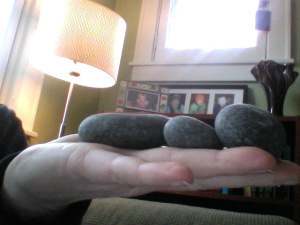 I keep them in my pocket almost all the time now. Because even when the story is stuck, and even when I go in like a vengeful angel and smite text with sword and fire, even when I erase everything, the person of Mara remains. Her indomitable self. Her sadness. Her rage. Her mistakes. Her slow path to forgiveness.
I keep them in my pocket almost all the time now. Because even when the story is stuck, and even when I go in like a vengeful angel and smite text with sword and fire, even when I erase everything, the person of Mara remains. Her indomitable self. Her sadness. Her rage. Her mistakes. Her slow path to forgiveness.
I love her. She infuriates me, but I love her anyway. And I keep her stones in my pocket as a talisman, as a physical thing that connects me to her, her story to the world. And they keep me sane.
For those of you in creative work, what are the things of the world that you bring with you as you sally forth into the uncharted waters of the the imagination – the dark heart of the Unknown? And for those of you in any kind of work, what are the things that allow you to keep doing what you’re doing? What are your talismans?
Filed under: Uncategorized Tagged: Lake Superior, Writers Resources, writing, writing fiction


January 23, 2013
The Winter Novelist’s Toolkit
Please note: Those in warm climates can ignore this. They can also keep their weather stories to themselves. I am currently wearing three pairs of wool socks and have situated as close to the fireplace as I dare to sit without fretting about the possibility of lighting my computer on fire. If you want to tell me about your writing desk’s proximity to the Mauian beach or the fact that the Gulf of Mexico breezes are currently drying the sweat between your toes or that your staff of slim-hipped cabana boys are, right now, handing you drinks with umbrellas in them and gently sponging the sweat from your unlined brow as you finish your chapter in your tank top and Bermuda shorts and contemplate if you want to eat your lunch while wading in the salt water or floating in the pool, then I will, very politely, tell you to can it.
I do not want to hear about warm places. I will pretend that you do not exist.
It is Minnesota here. And it is winter. And it is friggin’ cold.
Now, here’s the thing about sitting at a desk and writing – it is cold work. Despite the fact that I sit on a yoga ball (so bouncy!) and that I take hourly breaks to dance around my office or do push-ups (so gnarly!), I get incredibly cold when I write. Today, for example, I have abandoned my office in favor of my spot by the fire. The window next to my desk is old and leaky, and even though it got up to a balmy 15 degrees today, (yesterday, the high was -5. We’re improving!) I was still shivering.
Still, sometimes we are on deadline. And sometimes, we have a story itching in our fingers that wants to get out. And sometimes we promised our writing group a new set of chapters MONTHS ago, and they are still waiting. All of these might be true. So even though we shiver and shake, we still need to get the words written. Because no matter what we do, our books will not – and will not ever – write themselves.
(Because our books, let’s be honest, are jerks. And they are lazy. And they expect us to do all the work. Blasted books.)
Anyhoo. I have made a list of useful things to be able to suffer the cold long enough to get the words written.
1. Fingerless gloves.
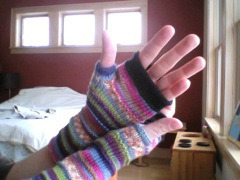 My mom got these for me a few years ago from Etsy. And they are magic. One of the problems with cold-weather writing is the fact that the knuckles get creaky. And once they are creaky, they are achy. And then they are hurty. And then it’s hard to write. Keeping the hands warm keeps the words going. And also, stripes. Stripes are magic. And so is wool.
My mom got these for me a few years ago from Etsy. And they are magic. One of the problems with cold-weather writing is the fact that the knuckles get creaky. And once they are creaky, they are achy. And then they are hurty. And then it’s hard to write. Keeping the hands warm keeps the words going. And also, stripes. Stripes are magic. And so is wool.
2. Tea

My daughter asked me once what I would do if tea was outlawed. I told her that I would be forced to turn to the dark side of the law, becoming a Tea Kingpin, slowly building an empire of tea and corruption. I’d be a tea-drinking gunslinger, with a pack of minions willing to do my bidding. My soul would twist and burn. I’d be like Mr. White in Breaking Bad. Do not take my tea away, goddamnit.
Anyway. Tea. Warms the hands. Warms the mind. Keeps the words moving. It’s the only thing keeping me alive at present.
3. Wool socks.

As I said: three pairs, currently. And I’m next to the fire. Remember in Harry Potter when Harry asks Dumbledore what his true heart’s desire is, and Dumbledore says “Really nice wool socks,” and Harry thinks he’s kidding? Well, that castle was drafty. And damp. And in England. And made of stone. Wool socks were exactly what Dumbledore needed. Dark Lord? Forget it. Warm toes – that’s what it’s all about.
4. Very Loud Music
Not when I’m writing, of course. I’m a silent writer. But once an hour, I need to stand up. I’ll do jumping jacks or push-ups (which are very warming) or I’ll run in place. Sometimes. But usually, I’ll get up and dance. The Lillingtons. James Brown. Iggy Pop. Sleater-Kinney. The Roots. Whatever. Nothing battles the freeze of stillness with the insistence of movement.
6. Chocolate
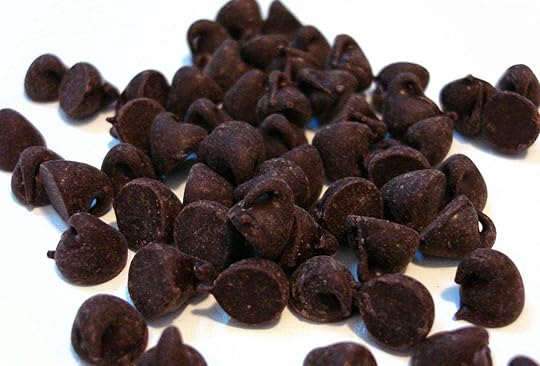
‘Nuff said.
It’s funny, I’m working on two books, one of which is set in Minnesota bog country in the middle of summer. And it is hot and humid and sticky. And wonderful. The other is in a world that is not our own, and it is hot as well. And I notice that the writing now is very slow. And deliberate. Because winter is coming. And the cold is waiting. And, even though it is imaginary, I want to hang out with my characters in an extended summer. Where I may leave my wool socks on the ground and let my toes sink in the muck. Where I may shove my fingerless gloves into the back pocket of my cut-offs and feed sugar to a grasshopper in the hollow of my hand. Where I may go with my computer to sit outside, with the sound of birds and birds and birds.
Now, if you’ll excuse me, I have a novel to write. Slowly.
Filed under: Uncategorized


January 18, 2013
Sometimes, a book saves us.
We had a rough day in Barnhill-Land yesterday. My son – good-natured, enthusiastic, vigorously naughty, and incredibly creative – pulled out all the stops in the carpool. He and the neighborhood miscreants (all wonderful, beloved boys; all prone to lapses in judgement; we grow, we stumble, we fall, we grow some more), in the back seat of the minivan, started in on a whirlpool of naughty talk. It was like they were all competing for the Jerk-of-the-Year award – and it’s only January. Bad words. Inappropriate jokes. Bathroom talk. Penis jokes. Pretending to flip off the driver (my neighbor; 250-pound ex-farmer; bad move, boys). And then actually flipping him off.
And it descended.
And they got mean.
And they got nasty.
At one point my neighbor turned the car around and started back for home. At the possibility of facing their mothers and generally being ratted out, they changed their tune instantly.
The thing is, I remember this from childhood. Bad energy. Bad air. And how it felt bad too, and kind of sick, and yet, upsettingly, vaguely exciting as well. Like violence on television – you don’t really like it, but you watch it again and again. And it grosses you out, but you can’t look away. And I remember how it fed on itself. And how, once it started, it couldn’t stop. The fights with siblings. The way my classmates and I would raise our hackles and turn on Substitute Teachers (the kid who could make a Sub cry was always held in high regard). Neighborhood squabbles. Playground nastiness. Mean girl stuff. Group divisions, carefully laying down who was in and who was out. I remember feeling the air change – how it would get heavy and thick, like the sky was pressing down – and either being the target of the nastiness, or standing by and saying nothing, too fearful to step up.
I know that sometimes kids will be aware of themselves behaving badly, but once it starts, they feel powerless to stop it.
They aren’t powerless, of course. They have all the power in the world. They just need to be taught. And that’s our job.
There was, yesterday, a flurry of emails between the parents. Yesterday afternoon, it was my turn to drive. I re-arranged the seating order, I got all the kids buckled, and then I pulled the car over. And rained fire.
“The adults who love you,” I told them, “are able to see your Best Selves. When you show your Worst Selves, it hurts us very much. Jeff loves you, and each of you hurt him today – either by your words, or by not standing up to your friends and telling them to knock it off. It hurt me, and it hurt the rest of the adults too. And it hurt you too. And you know it. Each of you was hurting this morning.”
When we got home, I had Leo own up to what he had done, and I had him write a letter of apology to our neighbor and deliver it in person. He didn’t want to do it. We talked about manning up.
Once we got to the other side of that, we talked about consequences. I’m a big believer in having kids take responsibility for their own behavior – and part of that is taking an active role in their consequences. Leo’s consequences are much harsher than I would have levied. But they are authentic to him. And they matter to him. And, what’s more, he knows what he did wrong, he doesn’t want to do it again, and he wanted to make amends.
By suppertime, we were emotionally exhausted, and spent.
“What if I stay bad?” Leo asked.
“You won’t darling. You will make choices. Some will be good and some will be mistakes. You’ll do your best to fix your mistakes. You’ll try to heal the things you break. Just like everyone else.”
“But what if I break?”
“Then you will fix you. Just like everyone. Everyone you see is broken. Everyone you know has mended cracks and parts that will never work right again. It doesn’t stop us from learning and loving. We mend, we heal, and we love the broken places. I have lots of broken places. But I still have a responsibility to work and love and build. And so do you.”
He was, last night, a shadow of himself. He was crumpled paper and shattered glass. The reality of being such a jerk to a person he loves and respects had devastated him. I hugged him, and he started to cry.
So I built a fire in the fireplace. I canceled my plans for the evening. I sent him upstairs to brush his teeth and told him to bring Treasure Island back down to me. We sat, he and I, under his Batman blanket next to the fire, stories of misplaced loyalties and loudmouthed squires and bloodthirsty pirates and the creaking hull of the Hispaniola spinning around us. And Jim, the cabin boy – brave, trusting, fatherless, full of big plans and adventuring. And John, the cook – broken, beaten, scheming, and yet, in the end, redeemable, and capable of that One Good Thing.
We read and read until he fell asleep on my shoulder, his little arms wrapped around my waist. My broken, brilliant, beautiful boy.
We are all mended cracks and creaky gears. We are broken smiles, broken hearts, broken minds and broken lives. We are hack-jobs and cast-offs and wobbly legs and gouged surfaces. We are soft edges, scuffed corners, ungleaming and unvarnished, but pleasant to hold and comforting to touch.
And we are lovely, and loving, and loved.
Filed under: Uncategorized Tagged: adventures in parenting, raising boys


January 13, 2013
Regarding my 1,000-year-old dog.
This is my dog.
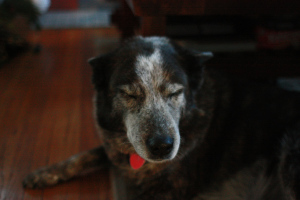 Her name is Harper, and she is very old. Decades. Centuries. A cool millenium. You might not believe me that she is actually 1,000 years old, and you might try to convince me otherwise, but I would like to point out that you have no proof. And she’s my dog. So.
Her name is Harper, and she is very old. Decades. Centuries. A cool millenium. You might not believe me that she is actually 1,000 years old, and you might try to convince me otherwise, but I would like to point out that you have no proof. And she’s my dog. So.
She has been in our family since 1998, back when my husband and I were two shacked-up quasi-Anarchist ne’re-do-wells, stomping around in our government-issued firefighter boots and quoting Saul Alinsky at whoever stood still long enough to listen. We lived in a house with a bunch of other twentysomethings and their various friends, partners and hangers-on – artists, puppeteers, Wobblies, graduate students, people who used to work for ACORN, and so on. I would make huge vats of beans and rice and someone would bring beer and we would play cards and eat and argue until early in the morning. My couch often had some guy sleeping on it. Some guy in need of a shower.
And then this dog showed up at our friend’s house.
In retrospect, I understand that the dog was a prophecy of sorts. A sooth-sayer. A sign.
Your life will change, the dog told us. Indeed, it is changing already.
She was in awful shape – hungry, filthy, cold. She had only just had puppies. She was still lactating and her womb was all busted out. She had the shakes. When you pet her, your hands turned black. She was frightened. If you moved your hands too quickly, should would cower and whine. She had a tender spot on her head that she didn’t want you to touch. She was wary, wounded. And I loved her. Instantly.
We weren’t going to keep her, not right away. We wanted her with a family. We had housemates with allergies, and couldn’t keep her indoors. She deserved parents and kids and teenagers. Someone to snuggle with next to a fire. Road trips. Hikes in the forest. A little child to dress her in a cape and a facemask and call her SuperDog.
These are the things we said. These are the things we believed. We didn’t know we were predicting our future.
It is happening already.
We brought her to the Humane Society, and then had to move heaven and earth to get her out and back home with us before they put her down (they had a policy not to keep mixed breed dogs alive, or even to make them available for adoption; they did not tell us this policy when we brought her in and told them explicitly that if they couldn’t place her with a family that we would take her, joyfully; there were, then, very tense words, uttered by me, with swearing; we got our dog in the end). I’ll tell you what, nothing bonds you to an animal more than saving her from certain death. Nothing at all.
We took her to the vet. “This is the healthiest half-starved dog I’ve ever seen,” the vet said. “She’s made of barbed wire and duct tape and galvanized steel.” He gave her some shots and removed her uterus and guessed that she was somewhere between three and five. “Clearly full grown,” he said, “but young enough to still be a spaz.” (It is now 2013. She is still a total spaz.)
She was a tough mother. She’d go on ten-mile runs with me and wouldn’t even get winded. She ate entire packages of bakers chocolate and didn’t even get a stomach ache. She ate, digested and shat batteries, and didn’t blink an eye. She never got sick, never got hurt, never skipped a beat.
We took her with us everywhere. We went for long hikes, Ted and I, our youthful resistance to life-long commitment starting to ease, our discomfort with aligning ourselves with institutional relationships drifting further and further away.
Family, we started to say. You’re my family.
You’re learning, said the dog. Good job.
We got pregnant. Got married. Moved. Bought houses. Sold houses. Started businesses. Wrote books. Had more children. We built. Expanded. Grew.
All the while, there was Harper the dog – babysitter, muse, helpmeet, protecter, janitor, exterminator, friend. She built us into a family.
Two summers ago, we brought her to the BWCA. She almost didn’t come back. Later that year, she developed a tumor on her leg that grew and grew and grew. It impeded her gait. It kept her from doing the things she loved to do. The vet counseled us not to do the surgery to remove it. “She’s so old,” the vet said. “She might not survive the surgery. And if she does, she will heal so slowly. She’ll hurt, she’ll infect, and she won’t know why.”
We did it anyway. Her tumor was three pounds – bigger than a puppy. She healed like a champ. The vet was amazed. “It’s one thing,” he said, “to have a dog the age of Methuselah. Lots of people have those. But to have an ancient dog heal as fast as a puppy? Either you’ve been replacing your dog with younger models of herself, or you have a dog who is virtually ageless. One or the other.”
And so I began to think that my dog is a thousand years old. I believed she would never die. I believed she would outlive me and my children and my children’s children. I believed that my dog was from Faerie, or Asgard, or Alpha Centauri.
Three weeks before Christmas, Harper suddenly started walking with a limp. A week before Christmas, she stopped putting any weight on her back left leg at all, preferring to move like an ambulatory three-legged-stool around the house and yard. And, all in all, she’s doing pretty well with it. She’s still eating, still drinking, still in high spirits, still chasing squirrels, still barking at the raccoons that hide between our garage and our neighbor’s fence. But she won’t let her leg touch the earth.
I took her to the vet.
He took a deep breath and sighed.
“Yep,” he said. “It’s weird.”
I hate weird.
She has, it seems, odd formations on her bone. It could be atypical bone spurs due to a weird manifestation of arthritis, or it could be bone cancer. In any case, due to her advanced age, we will treat it the same way – palliative care and lots of love until that doesn’t work anymore.
Which means that I am actually going to have to get used to the fact that my dog will not live for another thousand years, and that she is not immortal, and that she is not from Mount Olympus or the Isle of the Blessed. She is herself. Harper. My dog. And I will love her and love until I can’t and she will live until she doesn’t, and that will be that.
I have written this entire blog post with Harper sitting on my feet. I gave her a piece of beef jerky a little bit ago, and I know that she is waiting patiently until another piece appears in my hands like magic for me to give to her. She shifts her weight and groans a bit. Her leg hurts. My heart hurts. She rests her chin on my knee.
Your life will change, she says.
I didn’t ask it to, I say.
No one ever does. Your life will change. Indeed, it is changing already. She breathes deeply through her damp nose and closes her eyes. She is alive, she is alive, she is still alive. For now. As we all are. And sometimes, that’s enough.
For all of you with dogs in your life: bless you. May your beloved animals live for a thousand years. May they change your life.
Filed under: Uncategorized Tagged: dogs, I love my mutt, Love story


January 11, 2013
Follow-up to the “should-we-give-up-the-internet” question
I should add that for the rest of that day, my darling child was offering me “proofs” that the internet was both worthwhile, useful, and necessary for daily life.
Like for funniness, for example. “How can you live without funniness, Mom,” she asked. “I mean, have you met yourself?”
One bit of proof is this video. And you know what, she’s right. Having the internet in the home is worth it for the muppets. Ninety percent of my internet searching is muppet-related. This is a fact. Here are my two favorite things in one little video: classical music and Beaker. Enjoy.
Filed under: Uncategorized Tagged: internet and the family, the muppets, Youtube totally rules



